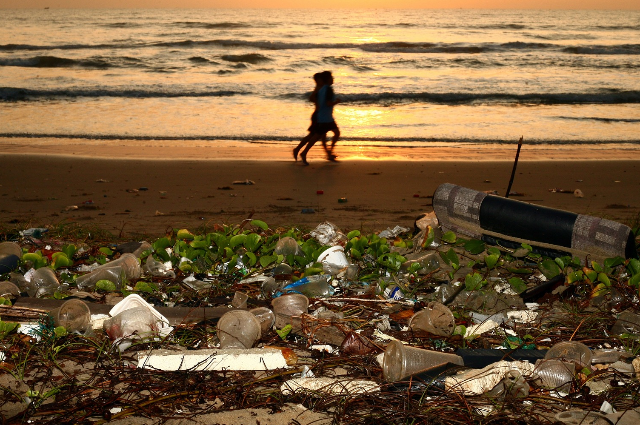
Plastic is the proliferation of plastic entities and pieces (e.g. plastic bags, containers, and microbeads) in the Earth's climate that adversely influences humans, wildlife, and their habitat. Plastics that act as pollutants are categorized by size into micro-, meso-, or macro debris. Plastic pollution has a huge impact on human health. Plastics are usually mixed with a large number of chemical dyes. All these dyes act as carcinogens and endocrine disruptors. In a research published in March 2022, for the first time, microplastic contamination was detected in human blood.
There are many debates on whether the invention of plastics is a blessing or a curse to science Plastic is a non-biodegradable chemical whose life cycle has no end. It does not mix easily with the environment Suppose, you throw plastic bottles, and packets somewhere after use. It turns out that the plastic you throw away is less than 50 microns thick, then the plastic you throw away will stay in the same place and no plants will grow in that soil. The negative impact of plastic products on the environment is termed “plastic pollution”.
Uses of Plastic in Daily Life
Plastic is present in most of the things we use in our daily life. No one carries paper or cloth bags to bring things from the store anymore. From toothbrushes and toothpaste to mobiles, from reading tables to storage cases, even the pens we use to write are made of plastic. Currently, life-saving medicines are packaged in plastic wrap. All these prove our excessive dependence on plastic.
Due to over-reliance on plastic products
According to a study, between 1950 and 2015, the amount of plastic waste accumulated in the world was 630 million tons (1 ton per 1000 kg). Surprisingly, 79% of that accumulated waste still exists on Earth if this trend of plastic waste continues, the amount of plastic waste will reach 1200 tons in 2050. The primary reason for this high reliance on plastic products is its low cost and availability plastic items can be used for a long time, are easy to clean, and do not take much trouble to move from one place to another. Plastic chairs and tables can be easily folded and stored in a corner of the room. Due to all these reasons, the amount of use of plastic products has increased excessively.
Impact of plastic pollution on sea level
The ocean and subsurface aquatic life are under threat today due to the misuse of plastic. Because the plastic waste that we throw on the roads, in the drains is washed away by the rainwater and falls directly to the sea level through the rivers. And these plastics exist in the ocean for years According to a study, the number of plastic bottles and bags that fall into the sea every minute is about 33,800. That works out to 13 million tonnes per year If this continues, it appears that in 2050 there will be more plastic in the sea than fish.
Plastic pollution and global warming
About 17 million barrels of oil are needed to produce plastic every year. Production of just 1 kg of plastic releases 2 to 3 kg of toxic carbon dioxide. This toxic carbon dioxide is largely responsible for global warming.
Effects of plastic on human
Using our excess plastic is like “stabbing yourself in the foot”. After buying fish, meat, and eggs from the market, we fill plastic containers and keep them in the fridge. But, when burning this container, the styrene gas released from it enters our bodies through inhalation or pores, causing complex diseases such as headache, fatigue, weakness, and even nervous system damage. When the sun shines on plastic in the ocean, it turns into microplastic, and this microplastic enters our bodies through fish.
Effects of plastic pollution on fauna
Do you remember the case of dead whales filled with plastic lying on the beach in Seattle in 2010? About 800 species of marine aquatic animals are affected by various diseases due to plastics that fall into the sea alone It is thought that octopuses will eventually disappear from the ocean due to plastic waste alone. Not only aquatic animals, but about 1 million birds suffer from plastic pollution every year.
What can be done to prevent plastic pollution?
The time has come to combat plastic pollution before it escalates. Recycling is the most effective way to prevent plastic pollution. It means reusing plastics that have been used once instead of throwing them away. Japan is the most advanced in this regard. Moreover, banning the use of plastics less than 50 microns thick is the need of the hour. Mandatory use of cloth or jute bags instead of plastic bags may be a good solution.
As much as we give to the environment, the environment will give back to us There is no denying that plastic is inextricably linked to our lives, after using plastic, it is our responsibility to store it in a certain place. In tune with Margaret Mead,
"If we destroy the environment, we will have no society."
